

SCG ร่วมกับ SCGC สำนักงานคณะกรรมการการศึกษาขั้นพื้นฐาน กระทรวงศึกษาธิการ กรมส่งเสริมคุณภาพสิ่งแวดล้อม กระทรวงทรัพยากรธรรมชาติและสิ่งแวดล้อม และเครือข่าย ชวนประชาชนร่วมตัดสินรางวัล “Popular Vote” (ขวัญใจมหาชน)
โดยการโหวตให้คลิปที่ชื่นชอบของเหล่า “หนูน้อยกู้โลก” ที่เข้ารอบ 20 รร. สุดท้ายจาก รร. ทั่วประเทศ ที่ส่งคลิปวิดีโอเล่าวิธีกู้โลกด้วยการจัดการถุงนม รร. ใช้แล้วให้น่าสนใจมาร่วมประกวด เพื่อรับรางวัลทุนการศึกษา 5,000 บาท
กติกาการโหวต เพียงกด Like (ไลค์) หรือ Share (แชร์) คลิปของ รร. ที่ชื่นชอบในอัลบั้มนี้ https://bit.ly/PopularVoteKidsSaveTheWorld (1 ไลค์ = 1 คะแนน และ 1 แชร์ = 3 คะแนน) ได้ตั้งแต่วันนี้ - 23 ก.พ. 66 และติดตามการประกาศผลผู้ได้รับรางวัล Popular Vote พร้อมรางวัลอื่น ๆ ได้ ในวันที่ 6 มี.ค. 66 ทาง Facebook : SCGofficialpage
ทั้งนี้ กิจกรรม “หนูน้อยกู้โลก” ซึ่งชวน รร.อนุบาล-ประถมศึกษาทั่วประเทศส่งคลิปเล่าวิธีกู้โลกด้วยการจัดการถุงนม รร. ใช้แล้วให้สร้างสรรค์และน่าสนใจ เพื่อรับเกียรติบัตร ชิงโล่รางวัล และทุนการศึกษารวมกว่า 100,000 บาทนี้ เป็นส่วนหนึ่งของโครงการ “ถุงนมกู้โลก” ที่ SCG และเครือข่าย ร่วมกันส่งเสริมการตัด ล้าง ตาก และรวบรวมถุงนม รร. กลับมาเป็นวัตถุดิบผลิตผลิตภัณฑ์พลาสติกรีไซเคิล เพื่อปลูกฝังจิตสำนึกให้เยาวชน “ใช้ให้คุ้ม-แยกให้เป็น-ทิ้งให้ถูก” สร้าง “เศรษฐกิจหมุนเวียน” เพื่อสิ่งแวดล้อมดี สังคมดี ตามแนวทาง “ESG” (Environmental, Social, Governance)
ผู้สนใจสามารถดูรายละเอียดเพิ่มเติมเกี่ยวกับกิจกรรม “หนูน้อยกู้โลก” ได้ที่ ้ https://www.scg.com/esg/highlight/kidsavetheword
การศึกษาฉบับใหม่ “อนาคตของไทยสตาร์ทอัพ และ Venture Capital”โดยดีลอยท์ คอนซัลติ้ง (“ดีลอยท์”) ชี้ว่า Startup ไทยจำนวนมากเผชิญความยากลำบากในการแข่งขันและดำเนินธุรกิจในปัจจุบัน โดยเฉพาะอย่างยิ่งเมื่อ Startup ในไทยยังคงประสบปัญหาในการเข้าถึงเงินทุนระยะเริ่มต้นจากแหล่งเงินทุนอย่างเช่น Venture Capital Firm (VC) ส่งผลให้ Startup ในไทยขาดแคลนเงินทุนที่ต้องการเพื่อนำมาใช้ในการดำเนินธุรกิจ
การศึกษาครั้งนี้จัดทำขึ้นโดยอ้างอิงข้อมูลจากการสัมภาษณ์ผู้มีส่วนเกี่ยวข้องกับระบบนิเวศ Startup ไม่ว่าจะเป็น ผู้ก่อตั้ง Startup VC และหน่วยงานภาครัฐมากกว่า 20 ราย ทั้งในประเทศไทยและประเทศอื่นๆในภูมิภาคเอเชียตะวันออกเฉียงใต้ รวมไปถึงอ้างอิงผลการวิจัยจากสถาบันต่างๆ ทั้งในประเทศไทยและต่างประเทศ โดยการศึกษาฉบับนี้มีเป้าหมายเพื่อชี้ให้เห็นถึงแนวทางที่เป็นไปได้ในการพัฒนาสตาร์ทอัพและ Venture Capital ในประเทศไทย
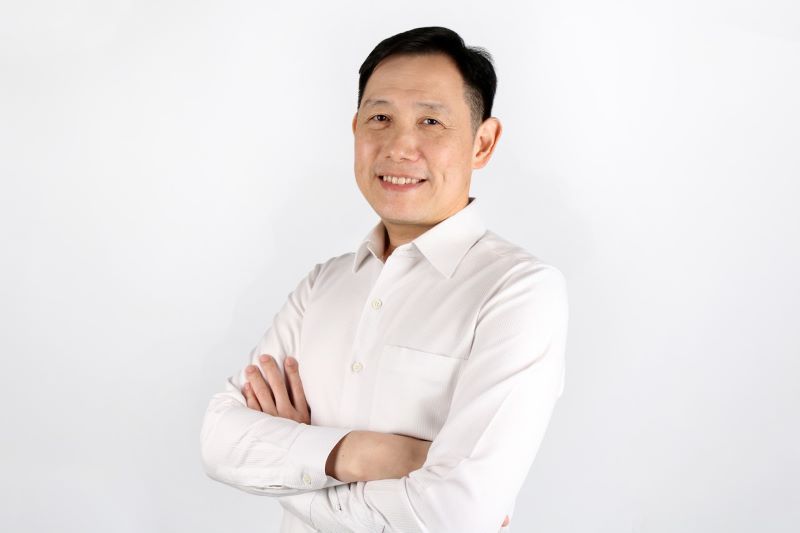
ปัญหาหลักของระบบนิเวศในประเทศไทยที่จำเป็นต้องได้รับการแก้ไข
จากการศึกษาระบบนิเวศในประเทศไทย เราพบว่าระบบนิเวศในประเทศไทยนั้นประสบปัญหาในหลายๆ ด้าน โดยปัญหาหลักที่ขัดขวางการเติบโตของระบบนิเวศนั้น มีตั้งแต่ปัญหาการเข้าถึงเงินทุน จนไปถึงความยากลำบากในการหาผู้ประกอบกิจการที่มีความสามารถ ยกตัวอย่างเช่น
· Startup ในไทยประสบปัญหาในการเข้าถึงเงินทุน (โดยเฉพาะอย่างยิ่งเงินทุนในระยะเริ่มต้น หรือ Seed Stage) จำนวนรอบระดมทุนของ Startup ในระยะเริ่มต้น หรือ Seed Stage ลดลงตั้งแต่ปี 2562 จากเดิมจำนวนรอบระดมทุน 33 รอบ ลดลงไปกว่าครึ่งในปี 2563 ตามข้อมูลจาก Innovation Club Thailand หนึ่งในสาเหตุของการลดจำนวนลง เกิดจากการที่ Accelerator แบบไม่เฉพาะเจาะจงประเภทธุรกิจของ Startup ระยะเริ่มต้นนั้นมีจำนวนลดลง นอกจากนั้น พื้นฐานของตลาด VC ในไทยยังมี VC จากบริษัทใหญ่ หรือ Corporate VCs (CVCs) ถือครองอยู่ ที่มักจะเน้นลงทุนใน Startup ระยะท้าย หรือ Later Stage
· โครงการสนับสนุน Startup จากหน่วยงานภาครัฐนั้นยังไม่เพียงพอที่จะตอบโจทย์ความต้องการของ Startup อันเนื่องมาจากมูลค่าเงินทุนสนับสนุนของโครงการนั้นยังไม่เพียงพอต่อความต้องการของ Startup การออกแบบโครงการที่ยังไม่ตอบโจทย์ความต้องการของ Startup ยกตัวอย่างเช่น การที่โครงการให้การสนับสนุน Startup ด้วยเงินทุนจำนวน 20,000 ถึง 150,000 ดอลลาร์สหรัฐ โดยที่แท้จริงแล้ว Startup ต้องการเงินทุนขั้นต่ำ 500,000 ดอลลาร์สหรัฐ เพื่อใช้ดำเนินการสำหรับ 1-2 ปี นอกจากนั้น จากการสัมภาษณ์ Startup เกี่ยวกับการเข้าร่วมโครงการของหน่วยงานภาครัฐ Startup หลายๆ ที่ยังประสบปัญหาเกี่ยวกับการทำเอกสาร และการเบิกจ่ายเงินสนับสนุน ซึ่งมีความยุ่งยากและใช้เวลานาน ความลำบากในการเบิกจ่ายเงินสนับสนุนนั้น ยังได้เพิ่มความกดดันให้กับผู้ประกอบกิจการในการบริหารเงินสะพัดของ Startups อีกด้วย
· Startup ไทยประสบปัญหาในการเข้าถึงที่ปรึกษาในประเทศเนื่องจากจำนวนที่ปรึกษาในประเทศไทยนั้นมีจำนวนจำกัด โดยปัญหานี้เกิดขึ้นจากการที่ประเทศไทย ไม่ได้มีจำนวนผู้ประกอบการ Startup เกิดขึ้นภายในประเทศเยอะ ส่งผลให้จำนวนปรึกษาที่สามารถให้คำปรึกษาแก่ Startup รุ่นใหม่นั้น มีจำนวนน้อยตาม ถึงแม้ว่าปัญหานี้จะสามารถแก้ไขได้ในอนาคตโดยอาศัยเวลาและประสบการณ์ แต่ปัญหาดังกล่าวทำให้ผู้ก่อตั้ง Startup ในไทย มีปัญหาในการเปิดรับแนวคิดความกล้ายอมรับความเสี่ยง และวิสัยทัศน์การขยายธุรกิจออกสู่สากล ซึ่งมีความจำเป็นต่อการสร้าง Unicorn Startups ในไทย
“ปัญหาที่ Startup ไทยเผชิญอยู่นั้นเป็นปัญหาที่มีความซับซ้อนและเกี่ยวข้องกับหลายภาคส่วน” ดร.เมธินี จงสฤษดิ์หวัง กรรมการผู้จัดการ ดีลอยท์ คอนซัลติ้ง กล่าว “เงินทุนระยะเริ่มต้นนั้นเป็นสิ่งที่จำเป็นอย่างยิ่งต่อ Startup ในการดำเนินธุรกิจ แต่ในขณะเดียวกันนั้นเอง VC หลายๆ เจ้ายังคงมองว่าระบบนิเวศ Startup ในประเทศไทยนั้นยังมีขนาดเล็กและยังไม่ได้พัฒนามากนัก รวมถึง Startup ไทยที่ประสบความสำเร็จยังมีจำนวนน้อย ส่งผลให้ VC ยังไม่กล้าที่จะลงทุนใน Startup ไทยซักเท่าไหร่”
“มีคำกล่าวที่ว่า It takes a village to raise a startup ในกรณีของประเทศไทยเราเชื่อว่าระบบนิเวศที่สนับสนุน Startup นั้นเป็นสิ่งที่ประเทศไทยจำเป็นต้องพัฒนาเป็นอย่างแรก” ดร.เมธินี กล่าว
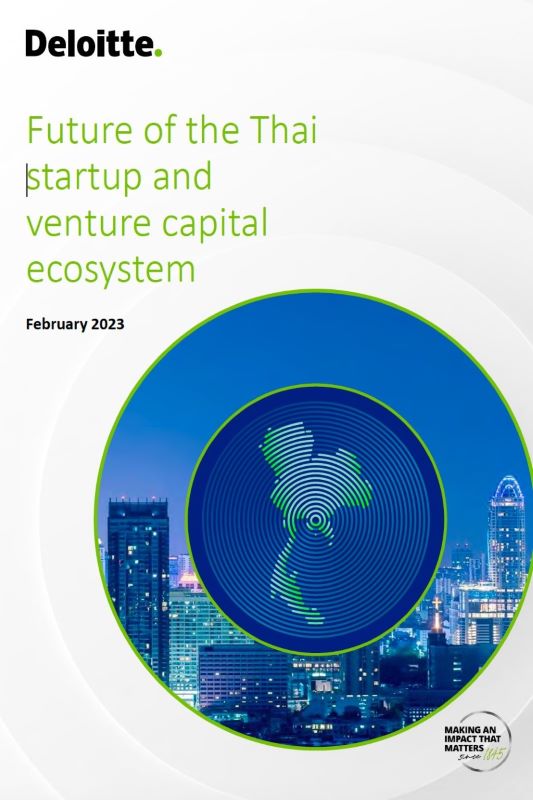
แนวทางในการพัฒนาระบบนิเวศในประเทศไทย:
จากการศึกษาระบบนิเวศในประเทศต่างๆ เราพบว่าระบบนิเวศที่ประสบความสำเร็จนั้น เกิดจากการร่วมมือกันของหน่วยงานภาครัฐ และเอกชน รวมไปถึงความเพียงพอของช่องทางในการรับแหล่งเงินทุน โดยเราเห็นว่า หน่วยงานภาครัฐในประเทศไทยสามารถทำหน้าที่เป็นผู้นำในการแก้ปัญหาต่างๆ ในระบบนิเวศและส่งเสริมการพัฒนาระบบนิเวศในประเทศผ่านแนวทางต่อไปนี้
1) จัดตั้งโครงการร่วมลงทุนระหว่างหน่วยงานภาครัฐและภาคเอกชน เหมือนอย่างในประเทศต่างๆ ยกตัวอย่างเช่น โครงการ SEEDS Capital ในประเทศสิงคโปร์ โครงการ London Co-Investment Fund
ในสหราชอาณาจักร เป็นต้น เพื่อเป็นการดึงดูด VC ให้เข้าร่วมโครงการ หน่วยงานภาครัฐสามารถที่จะพิจารณาออกแบบโครงการร่วมลงทุนนี้ให้ช่วยลดความเสี่ยงที่ VC ต้องแบกรับในการลงทุนใน Startup และนำเสนอโอกาสสร้างผลตอบแทนส่วนเพิ่ม (Upside Return) แก่ VC โดยโครงการเหล่านี้ ไม่เพียงแต่สนับสนุนด้านการเงินแก่ Startup แต่ยังช่วยให้ Startup ได้ความรู้ความสามารถในการดำเนินการธุรกิจ ความเข้าใจตลาด และเครือข่ายในการดำเนินธุรกิจ จาก VC อีกด้วย
2) พิจารณาการเพิ่มงบประมาณสำหรับการส่งเสริม Startup และพัฒนาโครงการเงินทุนสนับสนุนจากหน่วยงานภาครัฐให้ดียิ่งขึ้น ยกตัวอย่างเช่น การเพิ่มเงินทุนสนับสนุน Startup สำหรับแต่ละโครงการให้มีมูลค่าเพียงพอต่อการสนับสนุน Startup เป็นระยะเวลาอย่างน้อย 1 ปี (เช่น การให้เงินสนับสนุนจำนวนอย่างน้อย 500,000 ดอลลาร์สหรัฐ ) นอกจากนี้ โครงการควรที่จะลดความยุ่งยากในการรับสมัครผู้เข้าร่วมโครงการ และเบิกจ่ายเงินสนับสนุน (เช่น การเปิดรับสมัครผ่านช่องทางออนไลน์ และการเพิ่มความรวดเร็วในการเบิกจ่ายเงินสนับสนุน)
3) จัดตั้งและมอบหมายอำนาจให้หน่วยงานที่มีหน้าที่ในการกำกับดูแลการพัฒนาระบบนิเวศ โดยหน่วยงานที่ได้รับมอบหมาย จะช่วยพัฒนาและดูแลโครงการส่งเสริม Startup และ VC ในระบบนิเวศ เพื่อเป็นศูนย์กลางในการพัฒนานวัตกรรม กำกับดูแลให้โครงการสนับสนุน Startup จากหน่วยงานต่างๆ ให้เดินไปในทิศทางเดียวกัน และจัดโครงสร้างให้กับโครงการที่มาจากแต่ละภาคส่วน อีกทั้ง หน่วยงานที่ได้รับมอบหมายนั้น จะช่วยพัฒนาการสื่อสาร และร่วมมือ ระหว่าง Startup และหน่วยงานของภาครัฐ นอกจากนั้น ยังสามารถช่วยจัดหาทรัพยากรที่ Startup สามารถเข้าถึงได้ง่ายอีกด้วย
“เราได้เห็นแล้วว่า โครงการร่วมลงทุนระหว่างหน่วยงานภาครัฐและภาคเอกชนที่ผ่านการออกแบบมาเป็นอย่างดี ยกตัวอย่างเช่น โครงการในประเทศสิงคโปร์ สหราชอาณาจักร และ ประเทศอิสราเอล นั้นมีความสามารถที่จะช่วยผลักดันและส่งเสริมการพัฒนาด้านนวัตกรรมของประเทศได้อย่างมีประสิทธิภาพ รวมไปถึงโครงการเหล่านี้ยังช่วยดึงดูด VC จากทั้งในประเทศและนอกประเทศให้เข้ามามีส่วนร่วมในการพัฒนาระบบนิเวศ Startup อีกด้วย” ดร.เมธินี กล่าว
“จากการศึกษาแนวทางในการพัฒนาระบบนิเวศในประเทศต่างๆ เราค้นพบว่าแต่ละประเทศนั้นล้วนมีปัญหาหรือความท้าทายในการพัฒนาระบบนิเวศที่แตกต่างกันไป และประเทศเหล่านั้นมีการพัฒนาแนวทางในการแก้ปัญหาที่แตกต่างกันออกไป การค้นพบครั้งนี้ช่วยยืนยันกับเราว่า โครงการหรือแนวทางแก้ปัญหาแบบ One-size Fits All นั้นไม่มีอยู่จริง และเราควรที่จะทำการศึกษาแนวทางแก้ปัญหาที่แตกต่างกันเหล่านั้นเพื่อเรียนรู้ว่าเราจะสามารถปรับปรุงและนำบทเรียนจากโครงการเหล่านั้นมาประยุกต์ใช้เพื่อพัฒนาระบบนิเวศในประเทศไทยต่อไปได้อย่างไร” เคนเนท เทย์ ผู้อำนวยการ ฝ่ายอุตสาหกรรมการเงิน ดีลอยท์ คอนซัลติ้ง กล่าว
“การพัฒนาระบบนิเวศนั้นจำเป็นต้องใช้เวลา” เคนเนท กล่าวเสริม “การพัฒนาความเป็นผู้ประกอบการ การปลูกฝังแนวคิดที่กล้ายอมรับความเสี่ยง รวมไปถึงการค้นพบไอเดียใหม่ๆ ล้วนแต่จำเป็นต้องใช้เวลา สิ่งเหล่านี้ไม่ใช่สิ่งที่สามารถจะพัฒนาหรือสร้างขึ้นได้ชั่วข้ามคืน”
“เราเชื่อว่าระบบนิเวศในประเทศไทยนั้นมีโอกาสที่จะพัฒนาเป็นระบบนิเวศที่สมบูรณ์ยิ่งขึ้นในอนาคต เป็นระบบนิเวศที่เต็มไปด้วย Startup ที่ประสบความสำเร็จ เป็นระบบนิเวศที่สามารถดึงดูด VC ทั้งจากในประเทศและต่างประเทศให้มาลงทุนใน Startup ไทย รวมไปถึงเป็นระบบนิเวศที่เต็มไปด้วยที่ปรึกษาที่พร้อมจะให้คำปรึกษาและความช่วยเหลือแก่ Startup หน้าใหม่ สุดท้ายนี้เราเชื่อว่าหน่วยงานภาครัฐและภาคเอกชนจะเป็นส่วนสำคัญในการผลักดันการพัฒนาครั้งนี้” ดร.เมธินี กล่าวเสริม
อ่านรายงานฉบับเต็มได้ที่ https://www2.deloitte.com/sg/en/pages/human-capital/articles/venture-capital-ecosystem-thai.html
Many believe that human is the toughest species on earth for a long time, we had fought through wars, plague and many deadly diseases but there is still one thing that we can’t defeat, i.e. cancer. Cancer is a fatal disease that has been known to kill humanity for centuries. We seem not to know how to successfully prevent and cure cancer due to the reason that every cancer patient has a distinct type of mutations within his/her tumor; thus it needs to be treated by a specific and precise medicine that doesn’t suit with everyone. However, with the 2018 Nobel Prize-awarded scientific findings and the discovery of modern medicine, it seems like there might be a cure for cancer after all.
Recently, MBA magazine got a chance to sit down with Dr. Trairak Pisitkun at Chulalongkorn University and talk about his Systems Biology Center. Dr. Trairak and his team have been developing an antibody drug that would help improve the ability of our own immune system to fight against cancer. Long before Dr. Trairak starting this project, he graduated from Mahidol University, Faculty of Medicine Ramathibodi Hospital in 1994, followed by specialized training in Internal Medicine and Nephrology. However, after working as a physician for a while, he felt like this was not enough for him; he wished that he could be doing something more than just following the guidelines for treating patients.
“I’ve realized that Thai doctors have been following guidelines from foreign doctors and I hope we could be doing something more innovative and more suitable for Thai people. Then again, by inventing innovations to help Thai people, I certainly need more knowledge in advanced science and technologies; so I decided to continue my career aboard as a researcher and scientist instead of a medical doctor”, Dr. Trairak said. He had been working at the National Institutes of Health or NIH in the United States of America for 9 years until he became a specialist in Systems Biology, Antibody R&D and Computational Biology. After moving back to Thailand 5 years ago, he has been working as Director of Center of Excellence in Systems Biology, Chulalongkorn University.
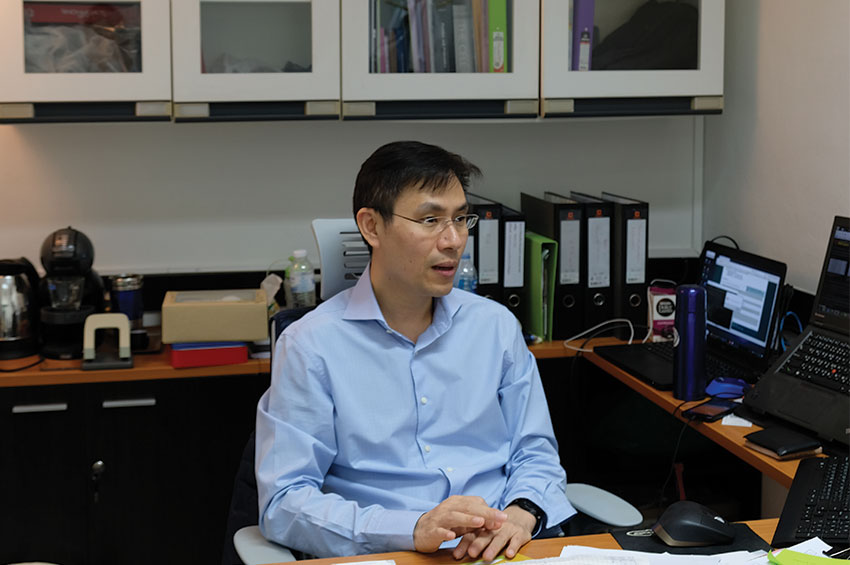
Currently, he has been developing an antibody drug to help Thai patients fight with cancer, before that he had been developing antibodies for basic research and diagnostic purposes. “Unintentionally, I’ve been invited to a closed group on social network for doctors and cancer patients who are interested in cancer immunotherapy. Every day, I would read stories of patients telling other people about their conditions and how it has miraculously gotten better after using the immune checkpoint antibody drug. It's incredible to perceive and, eventually, I was sold and desired to develop this type of medicine for Thai people using our antibody technology mainly because the extravagant cost, yet amazing efficacy, of this treatment”.
In America, Vice President Joe Biden has proposed a program called “Cancer Moonshot” during his Vice Presidency to support the research for curing cancer. By accelerating cancer research, the Cancer Moonshot program aims to make more effective therapies available to more patients, while also improving our ability to prevent cancer and detect it at an early stage. There have been cured cases in America by using immunotherapy which Dr. Trairak hoped that one day he and his team would be able to provide this kind of treatment for Thai people at an affordable price that would allow anyone to have access.
Instead of treating cancer by chemotherapy or radiation which would cause damages to other normal tissues and organs within our body, immunotherapy helps improve the ability of white blood cells and prevent cancer from blocking white blood cells to fight against them without damaging our body. After Dr. Trairak explains to us about the immunotherapy, we got a chance to ask him some questions that would help provide more understanding on the therapy and the plans that he has for Thai patients.
Is there a chance that we could use some kinds of gene sequencing analysis to help us know in advance or warn us that we have cancer?
There are some cases such as hereditary cancers that would allow us to predict in advance about whether we would have cancer, but there are only 8% chance of hereditary cancers. A majority of cancers are caused by somatic mutations; the likelihood that this will happen increases when we get older. This condition also depends on various exposures that we got from the environment such as food that we consume or chemicals to which we had been exposed. The current concept in cancer biology emphasizes that the sickening of the immune system is the cause of cancer progression. All of us always have a chance to get cancer, but it doesn't happen to everyone due to the defensive power of our immune system. By harnessing the natural defense, immunotherapy is effective and durable; moreover, it has fewer side effects than other types of cancer treatment.
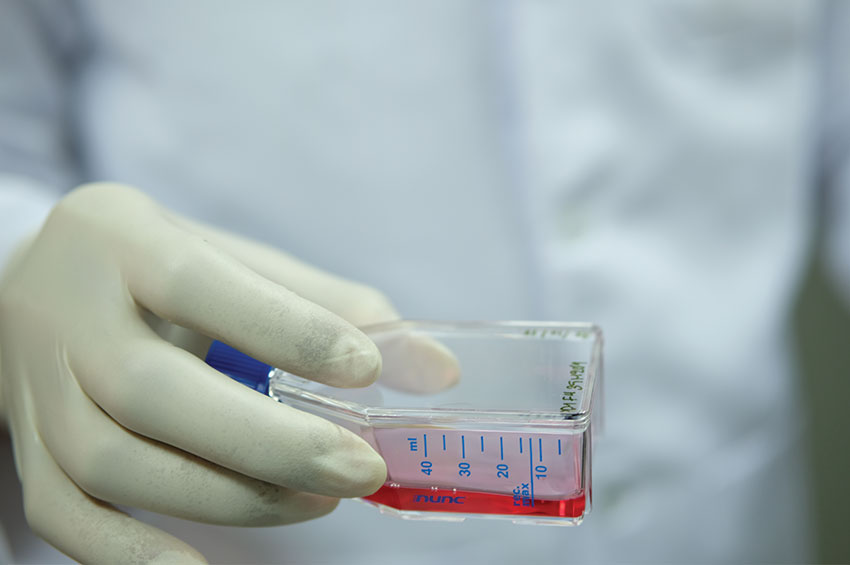
What’s the percentage of success?
With the current indications, the percentage of success is still moderate (20-30%) in advanced cancer patients that are using this antibody drug. But considering that this medicine has been out in public for only 4 years, I believe that the advance in immunotherapy research will further improve the outcome of this treatment substantially.
The Progress of Developing Medicine in Thailand
Dr. Trairak mentioned that his center is developing their own antibody drug. They generate the antibody drug by immunizing mice and later screening for antibody-producing white blood cell clones that would secrete the proper mouse antibodies (Phase 1). They have to modify the mouse antibodies to make them as close to human antibodies as possible to avoid other side effects that the medicine would have on the human (Phase 2). However, some processes would require technical assistance from the overseas laboratory as specific skills are lacking in Thailand. Currently, they have found a potential antibody drug prototype that would worth to pursue further and are waiting for the next step of the process (Phase 2) to start.
Right now, Dr. Trairak has started fundraising for the immunotherapy project by asking Thai people to donate 5 baht each to the project. He has hoped that the fund would rise to 200 million baht within 1 year to get to the large-scale production step (Phase 3). If everything has gone according to plan, the antibody prototype will be produced at large scale (Phase 3: 18-24 months) and then studied on animals first (Phase 4: 20-24 months) then he would move to experiment on human subjects (Phase 5: 48-60 months) before getting an approval by Thai FDA and distributing the medicine out to be sold in hospitals in Thailand with the aim of pricing at 20,000 baht per dosage, if possible. The entire process would require at least 8-10 years with the total budget of at least 1,500 million baht. Currently, the funding has reached over 100 million baht, and the funding is increasing every day with the hope that they would reach Phase 3 of the developing process by the end of next year.
Dr. Trairak also recommends that everyone could start preventing many types of sickness by starting regular exercise and controlling body weight from now on which would help make our immune system stronger and could possibly preventing cancer from growing. The "Thai version" antibody drug is still in the early developing stage, but from what we have learned from Dr. Trairak, we have realized that, with the advancement in immunotherapy, we have finally see the light at the end of the tunnel for cancer curing.
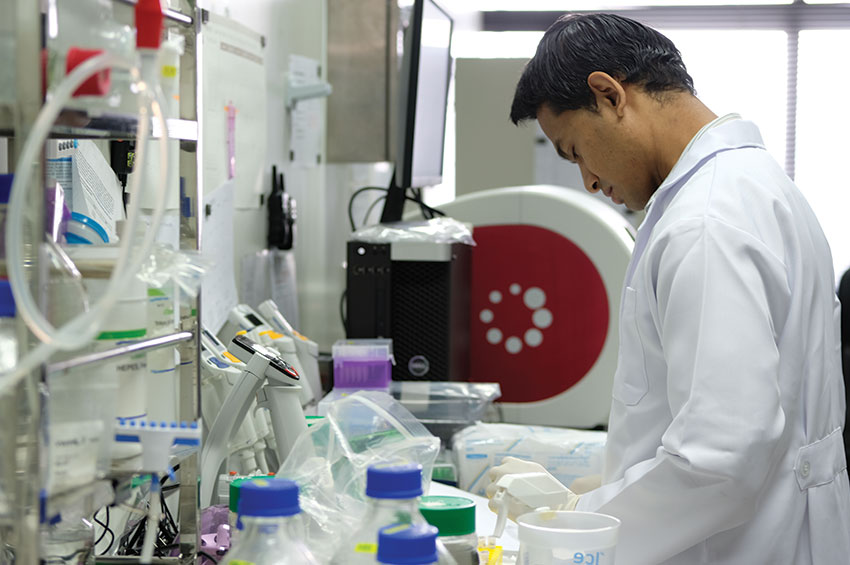
Everyone Deserves a Chance to Survive from Cancer: How to support and make this cancer-curing project comes true?
To make this medicine comes true for Thai cancer patients and contribute to the future endeavour of cancer immunotherapy research in Thailand, "Chulalongkorn Cancer Immunotherapy Excellence Center" open for donation with the following information:
408-004443-4 (saving account)
045-304669-7 (current account)
Bank: Siam Commercial Bank
Branch: The Thai Red Cross Society
Account name: Faculty of Medicine, Chulalongkorn University
Contact: https://www.facebook.com/CUCancerIEC/
Email: This email address is being protected from spambots. You need JavaScript enabled to view it.
Tel: 097-014-4978/ 088-902-2370/ 02-256-4183
Authors & Photos:
Pinploy Poonkham
Satida Pichanusakorn